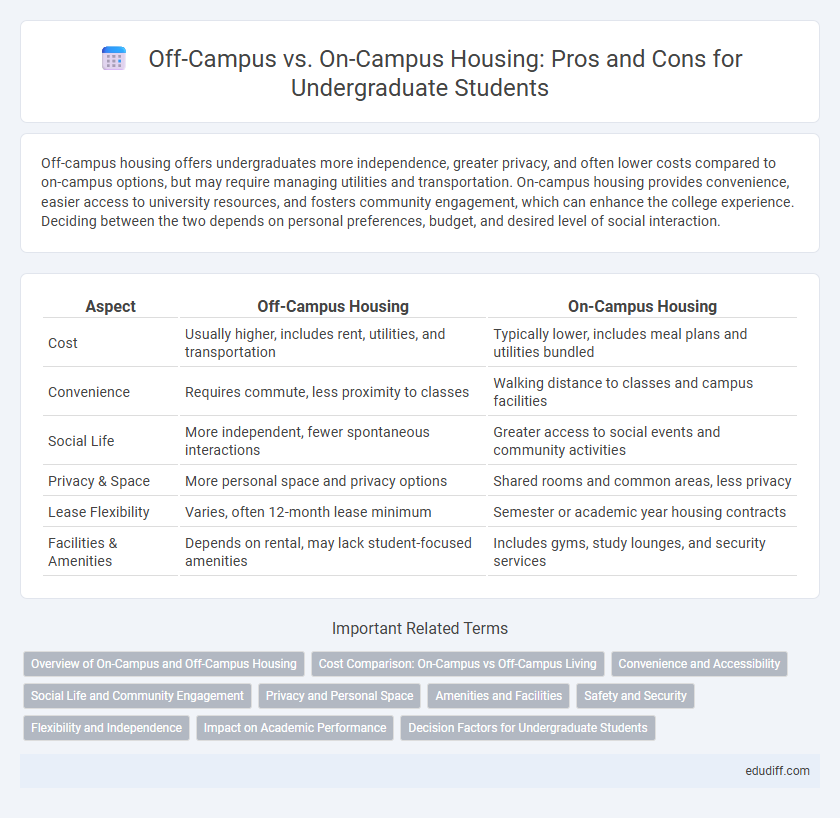Off-campus housing offers undergraduates more independence, greater privacy, and often lower costs compared to on-campus options, but may require managing utilities and transportation. On-campus housing provides convenience, easier access to university resources, and fosters community engagement, which can enhance the college experience. Deciding between the two depends on personal preferences, budget, and desired level of social interaction.
Table of Comparison
| Aspect | Off-Campus Housing | On-Campus Housing |
|---|---|---|
| Cost | Usually higher, includes rent, utilities, and transportation | Typically lower, includes meal plans and utilities bundled |
| Convenience | Requires commute, less proximity to classes | Walking distance to classes and campus facilities |
| Social Life | More independent, fewer spontaneous interactions | Greater access to social events and community activities |
| Privacy & Space | More personal space and privacy options | Shared rooms and common areas, less privacy |
| Lease Flexibility | Varies, often 12-month lease minimum | Semester or academic year housing contracts |
| Facilities & Amenities | Depends on rental, may lack student-focused amenities | Includes gyms, study lounges, and security services |
Overview of On-Campus and Off-Campus Housing
On-campus housing offers convenient access to university facilities, social activities, and academic resources, fostering a strong campus community experience. Off-campus housing provides greater independence, often at a lower cost, with a wider range of living options such as apartments or shared houses near the university. Both choices impact student lifestyle, budgeting, and time management, influencing overall college experience and personal growth.
Cost Comparison: On-Campus vs Off-Campus Living
On-campus housing typically includes utilities, internet, and amenities in a bundled cost averaging $8,000 to $12,000 per academic year, providing predictable monthly expenses for undergraduates. Off-campus housing costs vary widely by location but often involve separate payments for rent, utilities, and transportation, which can total from $7,000 to $15,000 annually, depending on proximity to campus and housing type. Evaluating these costs against personal budget constraints helps students decide between the convenience of on-campus living and the potential savings or flexibility offered by off-campus options.
Convenience and Accessibility
On-campus housing offers unparalleled convenience with immediate access to classrooms, libraries, and campus events, reducing daily commute time significantly. Off-campus housing often requires reliance on public transportation or personal vehicles, which can increase travel time and limit flexibility. Proximity to academic buildings and campus resources in on-campus housing enhances punctuality and participation in extracurricular activities.
Social Life and Community Engagement
On-campus housing offers undergraduate students immediate access to campus events, clubs, and social activities, fostering a strong sense of community and easier networking opportunities. Off-campus housing can provide more independence but may limit spontaneous social interactions and involvement in campus life, requiring students to actively seek engagement. Choosing on-campus living enhances opportunities for collaboration, peer support, and participation in organized group activities, which are critical for building lasting social connections.
Privacy and Personal Space
Off-campus housing offers undergraduates greater privacy and personal space with private bedrooms, kitchens, and living areas tailored to individual preferences. On-campus housing often involves shared rooms and communal bathrooms, which can limit opportunities for solitude and personal customization. Students seeking autonomy in their living environment typically find off-campus options more conducive to private study and relaxation.
Amenities and Facilities
On-campus housing offers convenient access to university amenities such as dining halls, libraries, and recreational centers, fostering a vibrant campus community. Off-campus housing provides greater privacy and flexibility, often including features like private kitchens, living spaces, and proximity to local amenities such as grocery stores and public transportation. Evaluating the balance between convenience and independence is crucial when choosing between on-campus and off-campus housing options.
Safety and Security
On-campus housing offers enhanced safety measures such as campus security patrols, controlled building access, and emergency response systems, providing a secure environment tailored for undergraduate students. Off-campus housing may lack these dedicated security features, potentially exposing students to higher safety risks depending on the neighborhood and landlord policies. Evaluating crime statistics and local law enforcement presence is crucial for undergraduates choosing between on-campus and off-campus living options.
Flexibility and Independence
Off-campus housing offers undergraduates greater flexibility in choosing living arrangements, allowing for personalized schedules and diverse social environments that foster independence. On-campus housing provides structured environments with set rules and easy access to campus resources, which can limit flexibility but support a transition to independent living. Choosing off-campus accommodations often requires managing leases and utilities, enhancing real-world skills essential for post-graduate life.
Impact on Academic Performance
Off-campus housing often provides a quieter, more personalized environment that can enhance focus and reduce distractions, positively impacting academic performance for undergraduates. However, on-campus housing offers immediate access to academic resources such as libraries, tutoring centers, and study groups, which can foster better study habits and collaboration. Students living on campus may benefit from structured social and academic support systems that contribute to higher engagement and improved grades.
Decision Factors for Undergraduate Students
Undergraduate students deciding between off-campus and on-campus housing often evaluate factors such as cost, proximity to campus, and access to facilities. On-campus housing typically offers convenience and included amenities like dining services and security, while off-campus options provide more independence and potentially lower rent. Students also consider lifestyle preferences, social opportunities, and commute times when making their housing choice.
Off-Campus Housing vs On-Campus Housing Infographic

 edudiff.com
edudiff.com